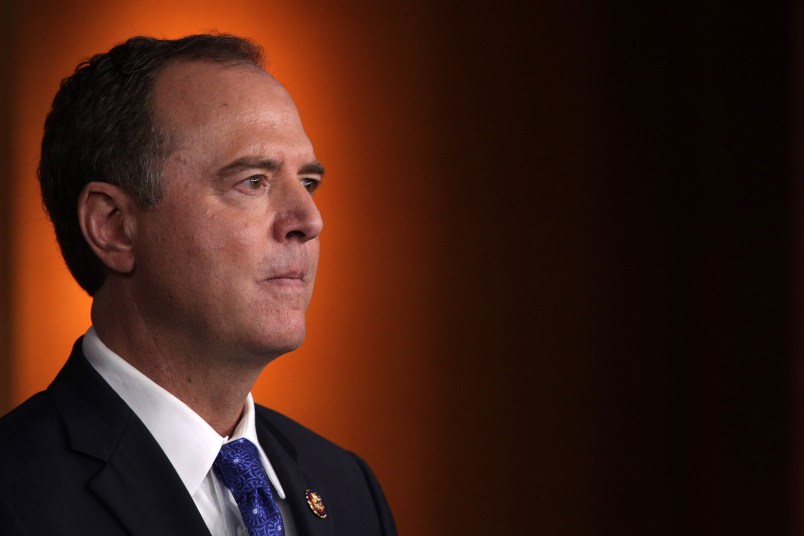President Trump’s decision to strong-arm Ukraine into becoming a domestic political ally for the 2020 election is merely the latest example of a pattern of soliciting foreign help, Rep. Adam Schiff (D-CA) argued in his opening statement in the Senate impeachment trial on Wednesday.
Schiff’s argument ties Trump’s alleged misconduct around soliciting foreign help in the 2020 election to 2016 and the resulting investigation of special counsel Robert Mueller into Russian interference.
The argument transforms allegations that Trump pressured Kyiv for dirt on Democratic candidate Joe Biden into a broad pattern of alleged misconduct, and turns the impeachment trial away from an effort to punish Trump for an isolated wrong and toward a push to remove him for repeated misdeeds.
To that end, Schiff played the infamous clip of then-candidate Trump asking Russia to “hack” Hillary Clinton’s email server during the 2016 election.
“Russia, if you’re listening, I hope you’re able to find the 30,000 emails that are missing,” Trump said at the time. “I think you will probably be rewarded mightily by our press.”
Immediately after that, Schiff played footage of former National Security Council aide Fiona Hill’s testimony before the House impeachment inquiry, in which she said that Russia attacked American democracy by interfering in the 2016 election.
Schiff addressed this early on in his opening statement. He said that the House decided to open an impeachment inquiry into Trump “with the knowledge that this was not the first time the President solicited foreign interference into our elections.”
“Candidate Trump implored [Russia] to hack opponents’ email accounts,” Schiff said. “Something that the Russian military intelligence agency did only hours later.”
The Los Angeles Democrat linked Trump’s 2016 statement to an October 2019 pronouncement the President made on the White House lawn, in front of a small army of reporters, in which he called for China to investigate the Bidens.
“The President has made it clear this was now going to be the last time,” Schiff said.
Schiff also relied heavily on the nature of the allegations that Trump and his personal attorney Rudy Giuliani pressed Ukraine to investigate.
Schiff referenced a recent, allegedly Russian state-sponsored hack on Ukrainian energy company Burisma — the focus of one strain of allegations against the Biden pushed by Trump.
“President Trump has made it abundantly clear that he would like nothing more than to make use of such dirt against Mr. Biden just as he made use of Secretary Clinton’s hacked and released emails in his previous presidential campaign,” Schiff said.
Another such conspiracy theory — which Trump brought up to Ukrainian President Volodymyr Zelensky in their infamous July 25 phone call — focuses on Crowdstrike, a firm that the DNC hired to investigate the Russian cyber-intrusion.
Trump pushed Zelensky on the call to investigate what Schiff referred to as a “fabrication,” in order to “remove what he perceived to be a cloud over his legitimacy, the legitimacy over his last election, Russia’s assistance with his campaign and suggest it was the Democratic Party that was the real beneficiary of help.”
Schiff went on to accuse Trump, by these examples, of using and abusing “the vast powers at his disposal to seek advantage in the next election” and of having “undermined our free and fair elections and compromised our national security.”
“Maybe the President really is above the law because they say you can’t indict the President,” Schiff added. “The attorney general’s position is that you can’t even investigate the President.”
The impeachment manager concluded with a question to the assembled Senators: “Are we really ready to say that? That the only answer to presidential misconduct is to, ‘get over it?'”






